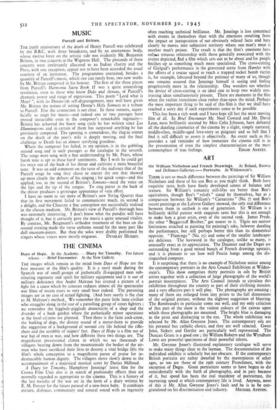THE CINEMA
Days of Hope. At the Academy.—Diary for Timothy. For future release. —Brief Encounter. At the New Gallery.
THE images which remain in the mind from Days of Hope are the best measure ot the film's quality. It is a story made during the Spanish war of small groups of pathetically ill-equipped men sub- stituting ingenuity and spirit for military equipment and it is out of military deficiency that Andre Malraux has created a picture of a fight for a cause which by contrast reduces almost all the spectacular war films of recent years to very small beer indeed. The persisting images are in no case of actual fighting. (And here surely is the clue to M. Malraux's method, We remember the puny little lame civilian who struggles along in the rear of a patrolling group of street fighters ; we remember the higgledy-piggledy domesticity of a shop and the disorder of a back garden where the pathetically minor operations o: the loyal citizens are planned. Then there is the faint cock-crow, the barking of dogs, the distant sound of a motor-horn to provide the suggestion of a background of normal city life behind the rifle- shots and the scrabble of snipers' feet. Days of Hope is a film not of war but of men at war, and how different these two things are. The magnificent processional climax in which we see thousands of villagers bearing down from the mountainside the bodies of the air- men who have sacrificed their lives to destroy a vital bridge lifts the film's whole conception to a magnificent paean of praise for in- destructible human dignity. The villagers move slove.y down to the accompaniment of a majestical musical score by Darius Milhaud.
A Diary for Timothy, Humphrey Jennings' latest film for the Crown Film Unit also is in search of profounder effects than are normally regarded as appropriate to the cinema. This is a history of the last months of the war set in the form of a diary written by E. M. Forster for the future perusal of a new-born baby. It combines picture, dialogue, commentary and natural sound with an ingenuity often reaching technical brilliance. Mr. Jennings is less concerned with events in themselves than with the emotions resulting from the impact or juxtaposition of not obviously related facts and here clearly he moves into subjective territory where one man's meat is another man's poison. The result is that the film's emotions have onlysa tenuous relationship with those generally associated with the events depicted, Ind a film which sets out to be about and for people finishes up as something much more specialised. The cross-cutting of Gielgud's performance in the graveyard scene from Hamlet with the efforts of a rescue squad to reach a trapped rocket bomb victim is, for example, laboured beyond the patience of many of us, though one remains assured that Jennings himself is seeing and feeling progrtssively more in the relationship. One wonders too whether the device of cross-cutting is an ideal one to keep two widely con- trasting ideas simultaneously present. There are moments in the film when the violent transitions close rather than open the mind. Perhaps the most important thing to be said of this film is that we shall have reached a sorry day if such experiments cease to be possible.
This has been a rich week and I have kept till last the most moving film of all. In Brief Encounter Mr. Noel Coward and Mr. David Lean, most brilliantly assisted by Miss Celia Johnson, have defeated all the dazzling cinesnatics of the cinema by a slight, simply narrated, middle-class, middle-aged love-story so poignant and so full that I find it still difficult to assess it objectively. An event such as this provides a sad reminder of how immature the cinema still is in the presentation of even the simplest characterisation or the most






























 Previous page
Previous page